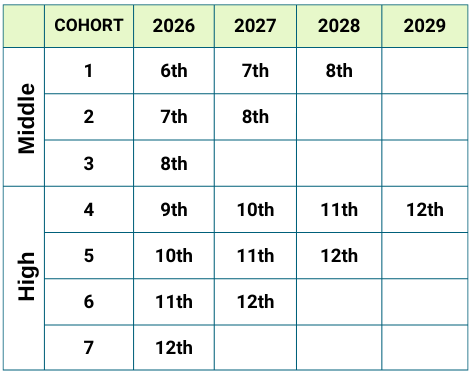Our Study
Our consortium will determine if (multiple) exposures to structured CS education experiences across various subgroups of students’ relate to:
- Motivation (self-efficacy, expectancy-value constructs), interest, and sense of belonging,
- CT knowledge, and
- Intent to pursue CS after high school.
Research Questions
- What, if any, structured CS education experiences early in adolescence predict increases in students’ attitudinal outcomes (i.e., CS interest, self-efficacy, value for CS, and sense of belonging within CS) and CT knowledge later in adolescence?
- Accounting for systemic differences in educational ecosystems, which characteristics relate to students’ decisions to engage CS education experiences during high school and their intentions to pursue CS after high school?
- Explaining relationships across time and within existing systemic differences in educational ecosystems:
- Which variables explain the relationship between structured CS education experiences early in adolescence and students’ attitudinal outcomes and CT knowledge later in adolescence?
- Which variables explain the relationship between demographic characteristics (i.e., school and student) and students’ decisions to engage structured CS education experiences/intentions to pursue CS after high school?
- Which variables influence the strength of the relationship between structured CS education experiences early in adolescence and students’ attitudinal outcomes and CT knowledge later in adolescence?
- Which variables influence the strength of the relationship between student and school characteristics and their decisions to engage structured CS education experiences/intentions to pursue CS after high school?
Our Study Design
We are pursuing an Accelerated Longitudinal Design over four years. Data collected for each year of the longitudinal study includes a middle and high school arm.

Our Progress
We are currently conducting a two-year pilot study to assess the feasibility of the longitudinal study. Elements of our pilot study include vetting and understanding:
- Research design and integrity (i.e., Evidence of reliability and validity for the data collection instruments, timing of data collection)
- Infrastructure (i.e., Availability and accessibility of necessary facilities and equipment for secure data collection, management, storage, and analysis)
- Legal/ethical considerations (i.e., ethical considerations around participant engagement (Smith & Harrison, 2009; Thabane et al., 2010), including identification of applicable regulations (e.g., COPPA, SOPPA, GDPR) and whether the project can adhere to these regulations)
- Staffing resources (i.e., Cooperation, support of others (teachers, administrators, local education administration (LEA), consortium members, legal, tech resource administration, graphic designer/marketing and communications))
- Costs (i.e., Participant costs, infrastructure costs)
- Socio-political forces (i.e., Corporate involvement in the consortium when weighed against the needs and trust of the students and communities, shifting priorities among consortium members, including the lead organization)
Our timeline spans seven years, with the timeline below showing the planned process.

